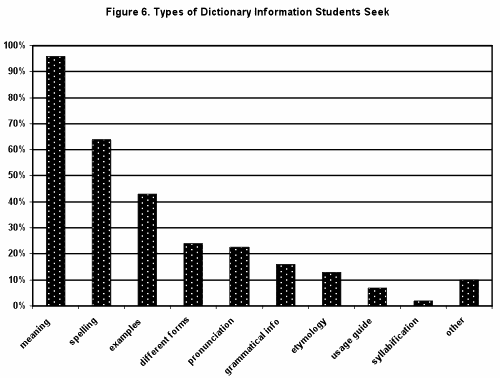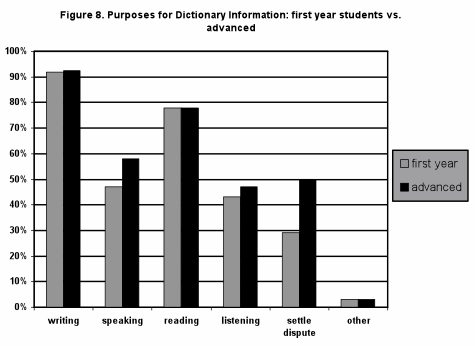Language Lounge
A Monthly Column for Word Lovers
Brief is Beautiful
If you can say it — you know, like they tell you when you're talking to your kids and you want to give them some advice — 21 words or less. So sometimes, the same is true in a song. If you've already said it after two minutes, then get out, you know.
— Singer/songwriter Tom Waits
The quote above is from an interview we listened to on the NPR program "Fresh Air" a few weeks ago. We'd never heard the parenting guidance about 21 words or less, but Mr. Waits' observation about the value of being brief did ring a bell. In the early 1990s, we worked on a dictionary that had its own proprietary software for the use of lexicographers. The editing interface took up the whole screen, but the window in which you could type the definition was tiny, and did not expand. It allowed only two lines of text before you had to use scrollbars. And when your definition ran over 21 words, the text turned red, reminding you that you needed to think about whether it was necessary to be so verbose. This became irritating, of course, but it was a good discipline, and it resulted in the publication of a good dictionary. Concision — the ability to express a great deal in a few words — has long been a skill at the heart of lexicography, and the requirement to keep definitions to a minimum length has been a chief concern of dictionary makers from the get-go.
The recent publication of the fifth edition of the American Heritage Dictionary gave media pundits an opportunity to muse on the death of print and the difficulty of selling an expensive, hefty reference book in the digital age. This public conversation is not new or unique to reference books, and it reflects a more specific conversation that has been going on in lexicography for over a decade: if we are now nearly finished with writing definitions that are subject to the severe space restrictions imposed by print publication, must definitions continue to be so terse? If the definitions live not on paper but on a multimegabyte CD, a multigigabyte hard drive, or in the limitless space of the cloud, should we not let them expand to a more comfortable length?
Makers of some online dictionaries clearly think so, and they have put forth the verbiage to prove it. Here, for example, is part of the entry for need from an online dictionary; one that is perhaps typical of newer digital-age dictionaries that are not the work of trained lexicographers:
need General: A motivating force that compels action for its satisfaction. Needs range from basic survival needs (common to all human beings) satisfied by necessities, to cultural, intellectual, and social needs (varying from place to place and age group to age group) satisfied by necessaries. Needs are finite but, in contrast, wants (which spring from desires or wishes) are boundless. See also Maslow's hierarchy of needs.
By way of contrast, here are some definitions of need from more traditional dictionaries:
- the psychological feature that arouses an organism to action toward a desired goal
- a condition marked by the lack of something requisite
- a lack of something wanted or deemed necessary
- a condition requiring supply or relief
- a requirement for something
- a condition requiring relief
- a thing required
We've given examples of more than one sense of need because in addition to its unusual length, the website definition above contains another defining no-no: it lumps multiple senses of need, both countable and uncountable,without making any conventional indication that it is doing this. The first sentence of the online definition refers to a noncount sense of need; the rest of the definition is for one or more distinct countable senses. Traditional dictionaries would typically split these senses into two or more numbered senses or subsenses.
Yet another feature of traditional dictionary definitions, displayed in all of the seven examples above but flouted in the long definition, is substitutability. Need, the word defined, is a noun, and the definitions themselves are all parsable as noun phrases. The definitions could be substituted for the noun they define in context and still yield a grammatical, comprehensible sentence. Traditional dictionaries cleave to this convention whenever possible, defining nouns by noun phrases, verbs by verb phrases or complete predicates, adjectives by attachable modifying phrases, and adverbs by adverbials.
But defining today has no barriers to entry from the gushing masses, and the Internet makes it possible to publish dictionaries containing entries of any length, in any format, that are not necessarily subject to traditional rules or conventions. So it's fair to ask: is abandoning the traditional short-form, substitutable definition, along with the paper it was once printed on, a case of throwing out the baby with the bathwater? Or is it a good opportunity to reinvent lexicography? In order to answer that question, today's dictionary maker should probably ask first: what will be most useful and helpful to dictionary users?
Some interesting answers to this question are provided by a paper published in 2007 in the journal Dictionaries, by Temple University professor Muffy Siegel. She surveyed 350 undergraduates in depth about a number of areas of dictionary use. The original paper (it will soon be available via Project Muse) should be required reading for anyone who fancies him- or herself a definer of words. Below, a couple of summary charts from the paper.


From these data, it seems reasonable to conclude that the most typical use of a dictionary by an undergraduate is to learn the meaning of a word that is required or encountered while writing or reading. The data suggest that dictionary look-ups are most typically an interruptive activity, a necessary diversion from a task that the user is already engaged in. Would information-seekers in this situation wish to be diverted by a long, discursive definition that discussed nuances of denotation, connotation, and usage? In most cases, probably not: human short-term memory has limited capacity and we do not always find it easy to resume concentration on a task from which we have been diverted if the diversion is so engrossing that it effectively writes over the contents of our working memory.
Undergraduates, of course, are not the only users of dictionaries; but it seems reasonable to assume that their use is typical, and this suggests that there will always be a place for the short definition: one that gives you just as much as you need to know to carry on with the task at hand.
The great opportunity that the Internet and the mobile web offer is the possibility to design dictionaries and definitions for many different purposes. People who want a discourse rather than a definition can post a question on a site like Quora, where some willing volunteer will probably deliver a 500-word essay on the meaning of a particular word. Example sentences — which Siegel found were highly sought after by undergraduates — have traditionally been a huge space-suck for print dictionary makers, and for that reason they are often kept to a minimum in print dictionaries. But now online dictionary sites like Vocabulary.com, the sister site of the Visual Thesaurus, take advantage of this need by supplying a wealth of contextual examples for dictionary entries. The digital age offers unlimited opportunities for helping people to unpack the meanings of words, but we expect that in defining, as in advice and songwriting, short and sweet will prevail for a long time to come.


